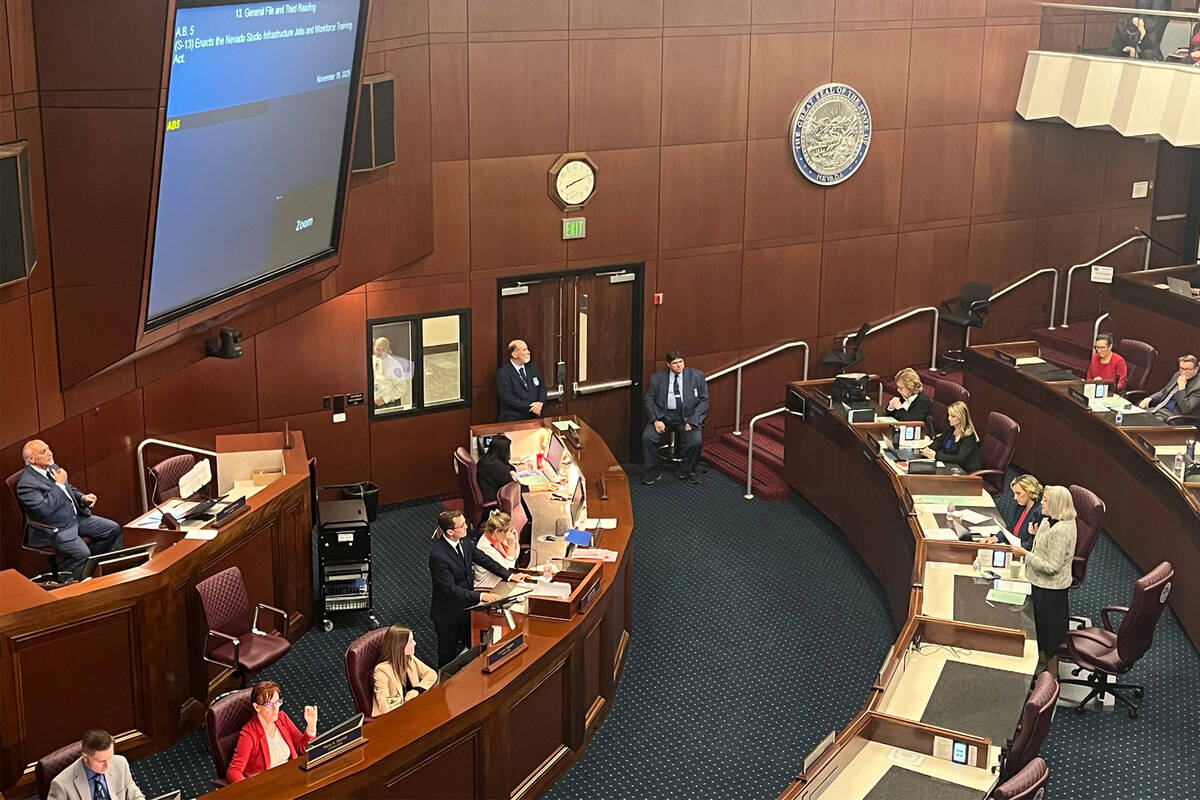Summerlin film studio development effort fails in Nevada Senate
CARSON CITY — A third attempt to bring Hollywood studios to Southern Nevada failed to get the green light from Nevada lawmakers on Wednesday in the final hours of the Legislature’s special legislative session.
Assembly Bill 5, proposing to tie $95 million of state’s transferable film tax credit program to the development of a film studio campus called Summerlin Studios, was the subject of contentious debates during the special session and intense lobbying efforts throughout the fall. The bill failed 10-8 in the state Senate, with three senators absent. It needed a majority of the Senate — 11 votes — to pass.
The Legislature ended the 7-day session about an hour after the vote.
Assemblymember Sandra Jauregui co-championed the Summerlin Studios push during the 2025 session and the special session. Jauregui, who is not seeking re-election in the Assembly and has announced a run for lieutenant governor, said after adjournment she was disappointed with the results, but “that’s the legislative process.”
“I did everything I could to make my case and it just didn’t have the votes,” the Las Vegas Democrat said. “So, you lose with grace, then it’s up to another Legislature in 2027 to decide whether they want to bring that policy forward.”
The failure rolled the credits in the latest installment of a multi-year effort to lure film and TV studios to Nevada with state incentives. A version of the idea first proposed in 2023, when Sen. Roberta Lange, D-Las Vegas, sponsored a bill to build two separate studio campuses through the expanded transferable film tax credit program. That bill never made it out of committee, and neither did her simplified version in the 2025 regular session.
Fierce debate defines the special session
The Summerlin Studios proposal has been the subject of controversy since it was first introduced earlier this year. It passed the Assembly 22-20 in the waning days of the regular session — the same slim margin as the special session’s version of the bill.
Special interest groups weighed in heavily to get the bill passed. A coalition of construction trades unions formed a political action committee to lobby to get the proposal on the special session agenda earlier this fall, and argued that the bill could create 19,000 construction jobs and nearly 18,000 jobs when the project completed. Meanwhile, progressive groups, government workers’ unions and fiscal conservatives decried the measure as unfair tax breaks to multi-national companies that would hurt the Nevada’s general fund.
Those lobbying efforts were the subject of multiple comments during the floor debate before the vote. Sen. Dina Neal, D-North Las Vegas, said the vote on the bill was a “referendum on special interests in this building.”
“I am angry about the political tactics that cause pain to my colleagues,” Neal said during floor debate. “I’m angry that there was some sense in this building that somehow people owe 100 percent loyalty — not even just 100 percent loyalty, but 1,000 percent — and that folks were in this were in this building looking for political corpses to press the button.”
Senate Minority Leader Robin Titus, R-Wellington, called out the intense lobbying effort on the first day of the session. As a vocal opponent of the Summerlin Studios proposal, she said she had not been approached about the bill but had heard from colleagues who felt the pressure.
“I want to say to them, and to this body, that I recognize that we are the ones elected,” Titus said in floor remarks on Nov. 12. “We are the ones that have canvassed voters, met with our families, and we are here to do what we feel is right for the state of Nevada, regardless of what your position is.”
The legislation narrowly survived an early challenge on the first day of the session. Assemblymember Selena La Rue Hatch, D-Reno, forced a vote to reject the measure from consideration, but the vote failed, and the bill was allowed to continue.
Assembly leadership tried to deem AB 5 as an emergency measure on Saturday, allowing it to be voted that day, but that failed, as well.
Two lawmakers, Las Vegas Republicans Brian Hibbetts and Heidi Kasama, were allowed to participate remotely in the Assembly vote when the bill was finally considered on Sunday.
Speaker Steve Yeager, D-Las Vegas, allowed them to vote remotely via video conference, an action that required him to declare “exceptional circumstances,” but Assemblymember Selena Torres-Fossett, D-Las Vegas, forced a vote to appeal the decision. She questioned why they were allowed to participate remotely, saying the two were preparing to go on vacation.
The remaining 40 members voted on the appeal, but it failed to pass, and the two remote members were allowed to cast their crucial ‘yes’ votes.
The bill would have required $1.8 billion in new capital investment by the end of the 2039 fiscal year and $4.5 billion in direct production spending over the 15-year span of the program ending in 2044. Transferable tax credits would have become available in 2029.
Still, opponents said the effect on the state’s general fund was too large to subsidize the risky film and TV industries. Fiscal analysts in the Legislature projected the general fund could fall below the required balance in the 2030 and 2031 fiscal years, assuming appropriations proposed in the special session were approved and that there was 3 percent annual growth in state revenue and expenses. That would have forced lawmakers to cut state spending or raise revenue elsewhere.
Contact McKenna Ross at mross@reviewjournal.com. Follow @mckenna_ross_ on X.



















